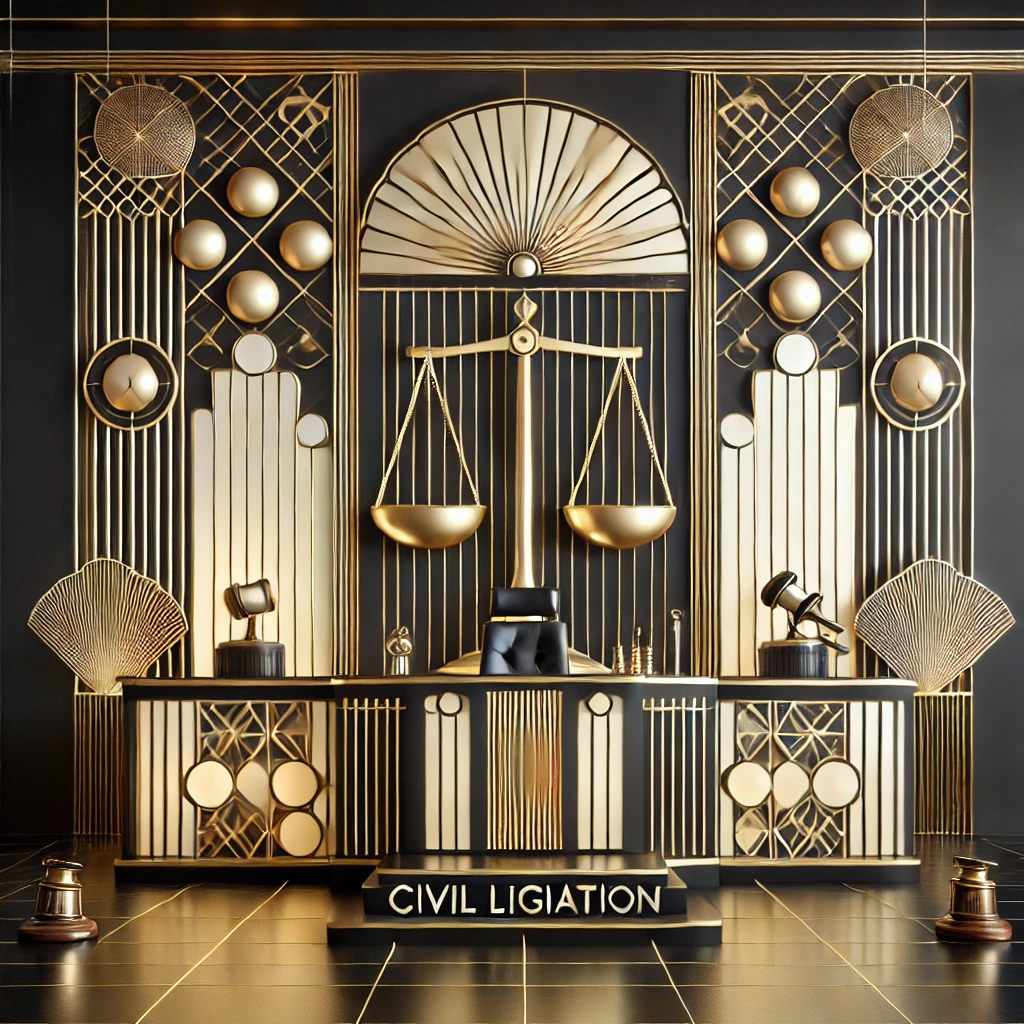A Comprehensive Guide to Civil Litigation in Bahrain
Civil Litigation in Bahrain is a critical component of the legal landscape, providing individuals and businesses with a formal mechanism to resolve disputes. Whether it’s a commercial disagreement, a contractual dispute, or a matter related to personal rights, civil litigation law in Bahrain offers a structured process to seek justice. This guide aims to provide an in-depth overview of civil litigation in Bahrain, including its processes, key features, and frequently asked questions.
What is Civil Litigation in Bahrain?

Civil litigation in Bahrain is the process by which disputes between individuals or entities are resolved through the civil courts. This legal avenue is used to settle disputes that are non-criminal in nature, including commercial disputes, contract issues, property disputes, and family-related matters. The primary purpose of civil litigation is to provide a fair resolution to disputes and ensure that justice is served in accordance with Bahraini law.
The civil litigation system in Bahrain is governed by Bahrain Decree-Law No. 12 of 1971, which established the Civil and Commercial Procedures Law. This law outlines the procedural rules for filing a lawsuit, presenting evidence, and appealing decisions, ensuring that the process is both fair and transparent.
The Civil Court System in Bahrain
Bahrain’s civil court system is designed to handle various types of disputes. The court hierarchy includes several levels:
- Court of Minor Causes: This court handles small claims and minor disputes, often related to contracts, property, or financial matters that fall below a specified monetary threshold.
- High Civil Court: The High Civil Court deals with more complex civil cases, including commercial disputes and matters involving higher amounts of money.
- Court of Appeal: Parties who are dissatisfied with a decision made by the lower courts can appeal to the Court of Appeal, which reviews both the factual and legal aspects of the case.
- Court of Cassation: The Court of Cassation is the highest court in Bahrain and serves as the final authority for appeals. It only reviews cases based on legal grounds, rather than re-evaluating facts.
The Civil Litigation Process in Bahrain
The civil litigation process in Bahrain follows a series of well-defined steps:
- Filing a Lawsuit: The process begins with the plaintiff filing a lawsuit in the relevant court. The plaintiff must submit all necessary documentation, including evidence to support their claim.
- Serving the Defendant: Once the lawsuit is filed, the defendant is formally notified, and they have the opportunity to respond. This notification is known as “service of process.”
- Pleadings: Both parties are required to submit pleadings that outline their claims, defenses, and supporting evidence. These documents help the court understand the positions of both parties.
- Pre-Trial Proceedings: During the pre-trial phase, the court may require both parties to attend hearings, submit additional evidence, or participate in mediation to resolve the matter without a full trial.
- Trial: If the case is not resolved during pre-trial, it proceeds to trial. During the trial, both parties present their evidence, call witnesses, and make arguments before the judge.
- Judgment: After hearing all evidence and arguments, the judge issues a ruling. The judgment can include compensation, specific performance, or other remedies as deemed appropriate.
- Appeals: If either party is dissatisfied with the outcome, they have the right to appeal the decision to a higher court.

Common Types of Civil Litigation in Bahrain
Civil litigation in Bahrain covers a broad range of disputes. Some of the most common types include:
- Commercial Disputes: Disputes between businesses, including issues related to contracts, partnerships, and trade agreements.
- Contract Disputes: Breaches of contract are a frequent cause of civil litigation. The courts handle disputes where one party fails to fulfill their contractual obligations.
- Property Disputes: Issues related to property ownership, leasing, and real estate transactions are common in civil litigation.
- Family Disputes: Civil courts in Bahrain also handle family-related disputes, including divorce, child custody, and alimony for non-Muslim families.
- Employment Disputes: Disputes between employers and employees, often involving wrongful termination, unpaid wages, or breaches of employment contracts.
Frequently Asked Questions About Civil Litigation in Bahrain
1. What is the cost of civil litigation in Bahrain?
The cost of civil litigation in Bahrain varies depending on the complexity of the case, the number of hearings, and the legal representation required. Costs typically include court fees, lawyer fees, and administrative expenses. Consulting a lawyer can help provide an accurate estimate of the expected costs.
2. How long does a civil litigation case take in Bahrain?
The duration of a civil litigation case in Bahrain depends on various factors, including the complexity of the case, the availability of evidence, and the court’s schedule. Simple cases may be resolved within a few months, while more complex cases can take several years, especially if appeals are involved.
3. Can foreign nationals file a civil lawsuit in Bahrain?
Yes, foreign nationals can file civil lawsuits in Bahrain. The Bahraini legal system is open to both residents and non-residents, allowing them to seek legal recourse for disputes that fall under Bahraini jurisdiction.
4. Is mediation required before civil litigation in Bahrain?
While mediation is not mandatory in all civil cases, Bahraini courts often encourage parties to attempt mediation before proceeding to full litigation. Mediation can help resolve disputes faster and more cost-effectively, without the need for a formal trial.
5. What role does a Civil Litigation Lawyer play in Bahrain?
A Civil Litigation Lawyer in Bahrain plays a crucial role in representing clients in court, drafting legal documents, gathering evidence, and providing legal advice throughout the litigation process. They help ensure that their clients’ rights are protected and that the case is presented effectively.
6. What types of evidence are admissible in civil litigation in Bahrain?
In civil litigation law, admissible evidence includes documents, witness testimonies, expert opinions, and other forms of proof that can support the claims or defenses of the parties involved. The court assesses the reliability and relevance of the evidence presented.
7. Can civil litigation judgments be appealed in Bahrain?
Yes, judgments in civil litigation cases can be appealed to a higher court in Bahrain. The appeals process allows the reviewing court to examine the case for legal errors or procedural issues that may have affected the original judgment.
8. How are civil judgments enforced in Bahrain?
Once a judgment is issued, it can be enforced through the execution courts in Bahrain. Enforcement may involve seizing assets, garnishing wages, or other measures to ensure compliance with the court’s ruling.
9. What is the difference between civil and criminal litigation in Bahrain?
Civil litigation involves disputes between individuals or entities seeking compensation or other remedies, whereas criminal litigation involves the prosecution of individuals or entities accused of committing crimes. Civil cases are usually initiated by the affected party, while criminal cases are prosecuted by the state.
10. What are the steps to initiate civil litigation in Bahrain?
To initiate civil litigation in Bahrain, the plaintiff must file a statement of claim with the appropriate court. This document outlines the facts of the case, the legal basis for the claim, and the remedies sought. The defendant is then served with the statement of claim and given an opportunity to respond.
The Importance of Legal Representation in Civil Litigation

Navigating the civil litigation law in Bahrain can be complex, especially for those unfamiliar with the local legal system. Engaging a qualified Civil Litigation Lawyer is essential for ensuring that your case is handled professionally and that your rights are protected. A skilled lawyer can assist with drafting legal documents, representing you in court, negotiating settlements, and providing strategic advice throughout the process.
Key Benefits of Hiring a Civil Litigation Lawyer
- Expert Knowledge: Lawyers specializing in civil litigation have in-depth knowledge of Bahraini law and court procedures, ensuring that your case is presented effectively.
- Representation in Court: A lawyer can represent you during hearings, making arguments on your behalf and responding to questions from the judge.
- Legal Strategy: A skilled lawyer will develop a legal strategy tailored to your specific case, helping you achieve the best possible outcome.
- Negotiation and Settlement: Many civil cases are settled out of court. A lawyer can negotiate on your behalf to reach a favorable settlement without the need for a trial.
The Role of Alternative Dispute Resolution in Civil Litigation
In recent years, Alternative Dispute Resolution (ADR) methods such as mediation and arbitration have gained popularity as effective alternatives to traditional civil litigation in Bahrain. ADR offers a less formal, more cost-effective means of resolving disputes, and can often lead to quicker resolutions than going through the full litigation process.
Mediation
Mediation is a voluntary process where a neutral third party, known as a mediator, helps the disputing parties reach a mutually agreeable solution. Unlike litigation, mediation is not adversarial, and the mediator does not make a binding decision. Instead, the parties work collaboratively to find a resolution. Mediation is often encouraged by Bahraini courts as a first step before proceeding to litigation.
Arbitration
Arbitration is another form of ADR that is frequently used in Bahrain, particularly for commercial disputes. In arbitration, an arbitrator or panel of arbitrators hears the evidence presented by both parties and makes a binding decision. Arbitration is often faster and more flexible than traditional court proceedings, and the decisions are enforceable in the same way as a court judgment.
The Appeals Process in Civil Litigation

If a party is dissatisfied with the judgment of a civil court in Bahrain, they have the right to appeal the decision to a higher court. The appeals process involves several stages:
- Filing an Appeal: The first step in the appeals process is filing a notice of appeal. This must be done within a specific timeframe, usually 30 days from the date of the original judgment.
- Review by the Court of Appeal: The Court of Appeal reviews both the factual and legal aspects of the case. The court may uphold, modify, or overturn the lower court’s decision based on its findings.
- Court of Cassation: If either party is still dissatisfied after the Court of Appeal’s decision, they may take the case to the Court of Cassation. This court only reviews legal issues, such as whether the law was correctly interpreted and applied by the lower courts. The Court of Cassation’s decision is final.
The appeals process is an important aspect of civil litigation law in Bahrain, as it provides a mechanism for correcting errors and ensuring that justice is served.
Enforcement of Civil Judgments in Bahrain
Once a civil judgment is issued, enforcement is carried out through the execution courts in Bahrain. The enforcement process may involve several measures, including:
- Seizure of Assets: The court may order the seizure of the debtor’s assets to satisfy the judgment. This can include bank accounts, real estate, and other valuable property.
- Garnishment of Wages: In some cases, the court may order the garnishment of the debtor’s wages, requiring their employer to withhold a portion of their salary to pay the judgment creditor.
- Court Orders: The execution court may issue orders requiring the debtor to comply with the judgment, such as transferring ownership of property or making specific payments.
The enforcement process is designed to ensure that the prevailing party in a civil litigation case receives the relief granted by the court. Engaging a Civil Litigation Lawyer in Bahrain can help navigate the complexities of the enforcement process and ensure that your rights are protected.
Conclusion: Understanding Civil Litigation in Bahrain
Civil litigation in Bahrain provides a formal process for resolving disputes that cannot be settled through negotiation or mediation. With a well-established legal framework and a structured court system, individuals and businesses can seek justice in a fair and transparent manner. Whether you are dealing with a commercial dispute, a contract issue, or a property matter, understanding the civil litigation process is crucial.
For those facing legal disputes, engaging an experienced Civil Litigation Lawyer in Bahrain can make all the difference in achieving a favorable outcome. With their expertise, you can navigate the complexities of the legal system and ensure that your rights are upheld.
If you need professional assistance with civil litigation in Bahrain, visit Alya Al Zeera Lawyer & Legal Services for expert legal support tailored to your needs.
